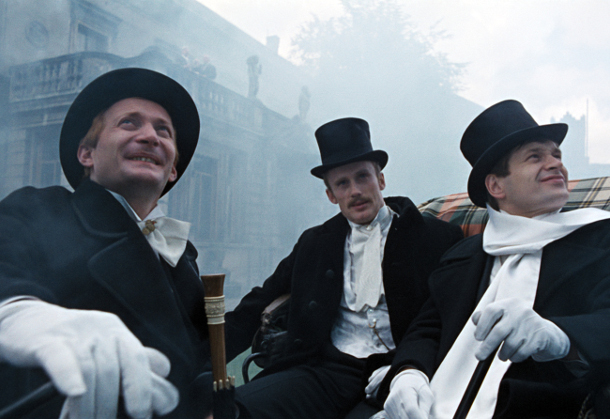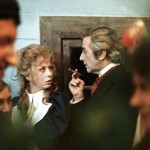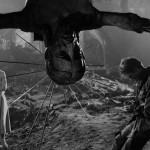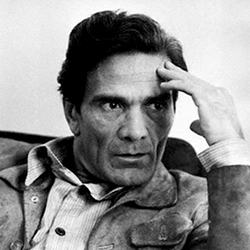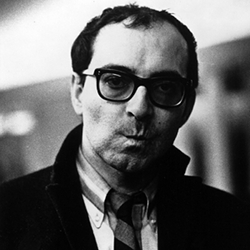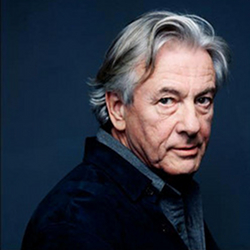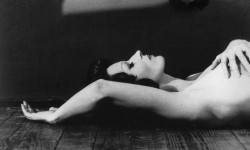
Martin Scorsese Presents: Masterpieces of Polish Cinema Review: The Promised Land (1975)
Cast: Daniel Olbrychski, Wojciech Pszoniak, Andrzej Seweryn
Director: Andrzej Wajda
Country: Poland
Genre: Drama
Editor’s Notes: The following review is part of our coverage for Martin Scorsese Presents: Masterpieces of Polish Cinema which ran from February 5th to 16th. For more information on this film series visit filmlinc.com and follow The Film Society of Lincoln Center on Twitter @FilmLinc.
Does a Polish anti-capitalist film made under communist rule (1975) adapted from a book written during the turn of the century (1898) at a time of Russian-Emperor rule tell us anything about contemporary America? Martin Scorsese seems to thinks so and has included it in his Masterpieces of Polish Cinema series.
The film tells the story of three unlikely capitalists who unite to build a textile factory in the city of Łódź in Poland. The leader of the trio is Karol Borowiecki (Daniel Olbrychski), a ruthless Polish nobleman who is trying to break away from his dwindling family heritage; Max Baum (Andrzej Seweryn) a German heir to another factory; and Moritz Welt (Wojciech Pszoniak), a paranoid Jewish businessman.
Does a Polish anti-capitalist film made under communist rule (1975) adapted from a book written during the turn of the century (1898) at a time of Russian-Emperor rule tell us anything about contemporary America? Martin Scorsese seems to thinks so [...]
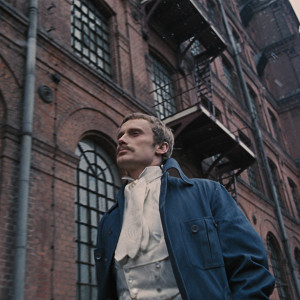 When Borowiecki starts an affair with Lucy (Kalina Jędrusik) the wife of a rival textile baron, he manages to obtain insider information about a change in import tariffs that allows him to make money on the stock market. This amongst other schemes gives the trio enough money to buy some land.
When Borowiecki starts an affair with Lucy (Kalina Jędrusik) the wife of a rival textile baron, he manages to obtain insider information about a change in import tariffs that allows him to make money on the stock market. This amongst other schemes gives the trio enough money to buy some land.
The three characters (or caricatures) live amongst a host of other greedy capitalists who would rather burn their textile factories to the ground for insurance than improve standards for the workers. When they get their plot of land for their new venture, they measure it out with footsteps from the corners before meeting in the middle and dancing around pouring champagne over their top hats.
Irrespective of the narrative, the film is a fascinating insight into the early industrial revolution of the 19th century, with long scenes set inside factories with workers at their looms. There is even a grim death scene where someone is pushed into a giant wheel, highlighting the dangers of working in a factory with little heed of expensive safety measures.
Directed by Andrej Wajda, the camera spends most of the beginning of the film in constant motion along tracks and swooping around characters – a technique that Scorsese obviously felt as influential [...]
Directed by Andrej Wajda, the camera spends most of the beginning of the film in constant motion along tracks and swooping around characters – a technique that Scorsese obviously felt as influential – and in later scenes the camera begins to close in on Borowiecki’s face as the tension between workers and industrialists leads to an explosive ending.
The acting takes a bit of getting used to, and the running length of the film will put a lot of people off, but the narrative becomes incredibly gripping and culminates in a Workers Revolution that would make Eisenstein blush. The anti-capitalist message throughout feels like a pastiche of what most American Republicans must think Eastern Europeans spend their lives consuming, but there is enough political nuance to keep the film interesting to the end. Worker’s of the world unite!
Related Posts
![]()
Ollie England
![]()
Latest posts by Ollie England (see all)


